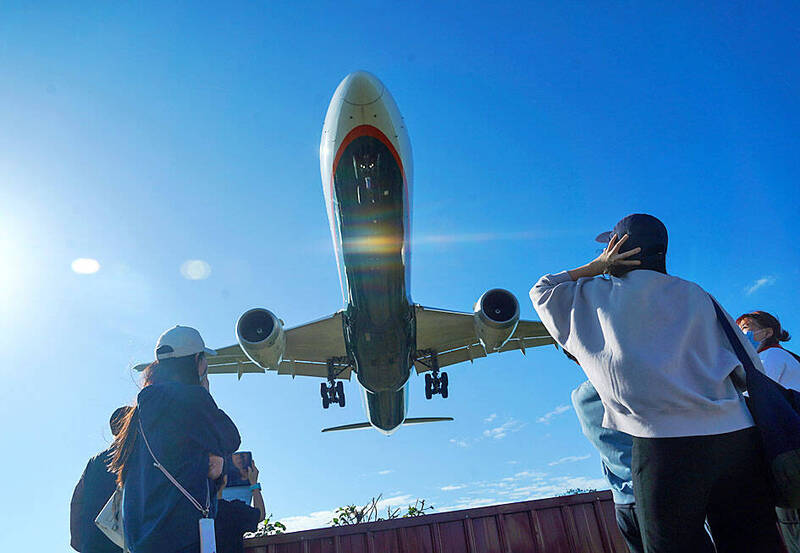《TAIPEI TIMES》Ministry touts bus electrification efforts

People watch a plane fly over their heads near Taipei International Airport (Songshan airport) on Jan. 19 last year. Photo: CNA
By Jonathan Chin / Staff writer, with CNA
Taiwan last year electrified 25 percent of public buses serving urban areas, a milestone on the path to Taiwan achieving net zero carbon emissions by 2050, the Ministry of Transportation and Communications said yesterday.
The push to make public buses electric was part of a NT$64.3 billion (US$1.96 billion) plan launched in 2023 to electrify buses, the ministry wrote in a report to the legislature’s Transportation Committee.
The project’s aim is to subsidize commercial bus operators to add 14,500 electric vehicles (EV) to their fleets to replace diesel-powered buses or as new purchases by 2030, it said.
As of November, the ministry has provided funding for 2,080 urban electric buses, of which 1,926 have been operationally certified, achieving last year’s target, the ministry said.
Officials installed 10,086 public charging points consisting of 7,681 slow-charging points and 2,405 fast-charging points to serve 92,166 private EVs, it said.
That means Taiwan reached the EU’s recommendation of 9.1 charging points for every privately owned EV, it said.
The nation has 23 fast-charging stations at 15 freeway service areas and one rest area, which have combined capacity to recharge 154 vehicles simultaneously, the ministry said.
A carbon footprint labeling program for enterprises in the logistics and transportation sectors that started last year provided eight classes and 21 conferences, it said.
A separate trial run with different training courses and guidance services for operators is to start this year and be expanded in the following years, it said.
Taiwan is planning to import sustainable aviation fuel for commercial airplanes and begin domestic production next year, the ministry said.
Sustainable fuel is derived from recycled biological materials.
The fuel later this year would be introduced to domestic airlines accessing Taipei International Airport (Songshan airport), Kaohsiung International Airport and Taiwan Taoyuan International Airport, the ministry said.
By 2030, sustainable fuels should comprise 5 percent of total domestic aviation fuel consumption, if all goes according to plan, it said.
The Ministry of Economic Affairs said in the report that it has established national standards to certify sustainable aviation fuel.
CPC Corp, Taiwan (台灣中油) is tasked with producing aviation-grade biofuel for long-term use, it said.
Taiwan should aim to substitute 10 percent of its aviation fuel consumption with biofuel, the National Science and Technology Council said.
Taoyuan airport consumes 3 million kiloliters of aviation fuel a year, it added.
Last year, the government cut emissions at airports by supplying power and air-conditioning to parked airplanes via air bridges, adding solar panels and supplying ground crew with EVs, it said.
Taoyuan airport replaced 35.7 percent of its ground support vehicles and installed 43 charging points for their use, the ministry said.
Taoyuan airport plans to increase the number of charging points to 70 by 2027, it said.
新聞來源:TAIPEI TIMES











